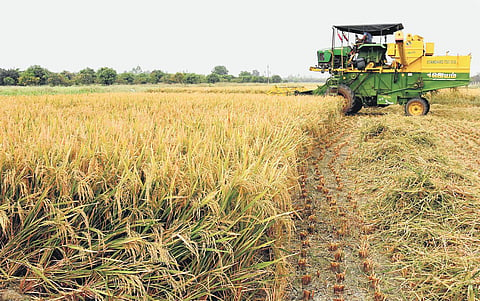

VIJAYAWADA: In an effort to enhance the production of different types of crops and at the same time to help farmers earn more income, scientists of Acharya NG Ranga Agricultural University (ANGRAU) have come up with 10 new varieties of seeds, including three rice varieties.
The new seed varieties have been approved by the Andhra Pradesh State Seed Sub-committee, headed by Special Chief Secretary of Agriculture. The new varieties are not only high yielding, but also resistant to lodging. The agriculture scientists have developed two new varieties of millets as the entire world is set to celebrate 2023 as the Year of Millets.
The new varieties of seeds approved for release this year include Finger Millet - VR 1099, Foxtail Millet - SiA 3159, Rice MTU 1318, Rice MTU 1232, Rice MCM 103, Blackgram LBG 884, Greengram LGG 574, Greengram LGG 607, Chickpea NBeG 776 and Groundnut TCGS - 1694.
The criteria for approval of the new seed varieties are that at least one year data in all India coordinated trials, three years of data in station trials, three years of data in multi-location trials in a constituency with recently released varieties or at least two years, three years of data in minikits organised by the Department of Agriculture in the districts where the variety is proposed to be released and the data should be of recent years and two years of data with large number of minikits.
Most importantly, the yield advantage should be 10% or 5% in case of any special characters. Germplasm should be deposited in the National Bureau of Plant Genetic Resources (NBPGR). It should have obtained IC number from NBPGR. The breeder should furnish package of practices for that particular variety and DNA finger printing of proposed variety should be provided for the specific photos and nutritional and quality parameters.
The State seed sub-committee after a careful scrutiny of the same, has approved their release. On the occasion, Poonam Malakondaiah, Special Chief Secretary of Agriculture, congratulated the scientists for their efforts in evolving new varieties and at the same time urged them to develop new seed varieties suitable for mechanical harvesting as the State government is encouraging farm mechanisation by providing subsidy for farm implements, besides setting up Custom Hiring Centres to help farmers.
According to ANGRAU senior scientists, Finger Millet - VR 1099 variety proposed to be named Gosthani variety is suitable to rainfed Kharif and irrigated Rabi. Recommended for all the growing areas in Andhra Pradesh, it has a duration of 115 to 120 days. Potential yield is 3,500 – 3,800 kg per hectare.
Foxtail Millet -SiA 3159, which is proposed to be named Mahanandi variety, is recommended for rainfed Kharif and irrigated Rabi and summer. The seed variety with a duration of 80-85 days has a potential yield of 3,087 – 3,269 kg per hectare.
Paddy variety MTU 1318 is suitable for Kharif and recommended for Godavari, Krishna and North coastal districts under transplanted conditions. The crop variety, which is of 150 days duration and has a potential yield of 7,500 kg per hectare, has special features like non-lodging, low grain shattering and performs well even under low ‘N’ management conditions (recommended N 75%) as that of Swarna. It is moderately resistant to leaf blast, neck blast and sheath rot and has field tolerance to BLB and BPH.
MTU 1232 paddy variety is also suitable for Kharif and recommended for flood prone areas. The crop duration is 135 to 140 days in normal conditions and 140-145 days in submergence conditions. It has a potential yield of 3,792 kg (floods) and 6,000 (normal) per hectare. It tolerates flash floods for 10 days (nursery to tillering) and stagnant flooding (30-50 cm) for more than one month. The variety has moderate resistance to brown plant hopper, leaf blast and sheath blight.
Another paddy variety MCM 103, which is good for Kharif, is recommended for salt affected soils of the State. It has a duration of 140 to 145 days with potential yield of 5,000-5,500 kg (saline condition), 6,000 kg (normal condition) per hectare. It has tolerance to salinity at seedling and reproductive stages, besides moderate resistance to leaf blast, sheath blight and WBPH. It is non-lodging and low grain shattering.Blackgram LBG 884 is suitable for both seasons and for rainfed and irrigated. It is tolerant to lodging and MYMV with an average yield of 2,000-2,200 kg per hectare.
Greengram LGG 575 is a short duration variety with tolerance to MYMV, ULCV, CL and WB. Greengram LGG 607 is also a short duration variety suitable for intercropping with resistance to MYMV and tolerant to ULCV and LCV along with foliar fungal diseases. It is suitable for Kharif, Rabi, upland and rice fallow situations, which has a potential yield of 1,500 to 1,700 kg per hectare, the scientists explained.
Focus on agriculture mechanisation for high yield
Poonam Malakondaiah, Special Chief Secretary of Agriculture, congratulated ANGRAU scientists for their efforts in evolving new varieties and at the same time urged them to develop new seed varieties suitable for mechanical harvesting as the government is encouraging farm mechanisation by providing subsidy for implements